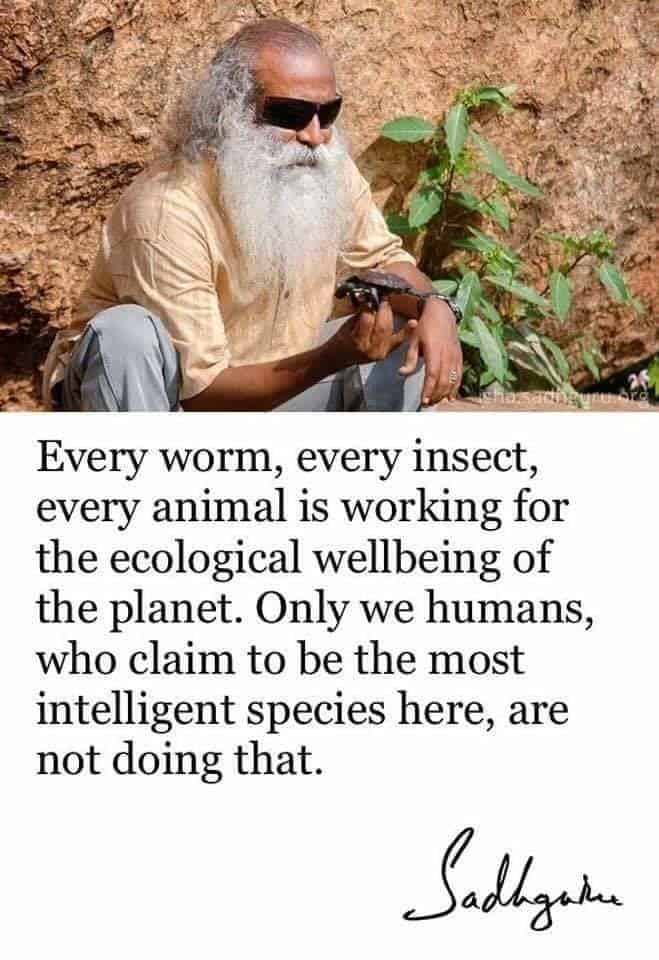Why Words Matter #1
I saw the following quote on Facebook recently, and it made me think (again) about how our word choice matters:

“Every worm, every insect, every animal is working for the ecological wellbeing of the planet. Only we humans, who claim to be the most intelligent species here, are not doing that.“
The quote is attributed to Jaggi Vasudev, otherwise known as Sadhguru, an Indian author and yogi.
So, what’s wrong with this seemingly innocuous and even accurate quote?
Well, to me, while I understand the intent of the words, I find them to be unsatisfying.
In particular, it’s the first sentence that I object too.
As worded, i.e. “is working for”, it sounds like these worms, insects, and other animals have some intention to benefit the planet, and that, I think, is highly unlikely.
Of course, we may never know, but the more probable explanation, to me, is that these animals are living their lives, doing what they do, and it just so happens that (most of) what they do is beneficial to the planet.
For example, they might create dung that fertilizes the soil, thus helping create new plants, which in turn might benefit the planet through the conversion of carbon dioxide into oxygen, and by providing food to animals.
But are the animals doing that because they know it’s a worthwhile, altruistic activity, or is it simply the way their digestive systems work – they take in food, they absorb whatever nutrients they need, and they get rid of the waste.
When I see sayings such as this, the way my brain seems to work is that I am always looking for the exceptions that prove the rule. In other words, is there any situation where that is not the case?
And I also think I apply my pedantic mind to word choice – are those the best words, and do they convey what was intended?
In terms of this quote, I think what was intended was the contrast between the way humans treat the planet vs. the way that the majority of non-human animals do.
But even in that summary, notice how I’m using the word “treat” as though animals are doing what they do by choice?
So maybe a better phrasing would be: I think what was intended was the contrast between the effects humans have on the planet vs. the effect that the majority of non-human animals have.
See the difference?
“Treat” implies choice, whereas “the effects they have” is less active.
It may be subtle, but I feel it’s important.
You could argue that the difference is too small to matter, because the overall sentiment is correct – and I would agree with that. I’m not suggesting for one second that humans, as a whole, are in fact treating the planet as a resource that should be nurtured and valued.
And if you look further, it’s a relatively small number of people who abuse the planet like that – the owners of companies who rape the earth in the name of corporate greed.
Having said that, many everyday folks are complicit in this, indirectly at least – because they buy the products that are the result of that abuse.
I get that it’s difficult these days to find products that are 100% “clean” – my late wife and I tried to live an organic lifestyle for years, and it’s really tough finding food, for example, that has no junk in it.
Even when you do see something that is claimed to be organic or non-GMO, it’s becoming increasingly difficult to know for certain whether those claims are actually true or not – and that’s because the corporations are trying to claim that their man-made products are “natural”.
For example, the companies who create GMO-foods are, on the one hand, trying to claim that their products are no different to what already exists in nature, but on the other hand, they have patented those creations, and you are not allowed to patent something that is natural.
They cannot have it both ways – even though they’re trying, because something is either natural, or it’s not.
And, of course, it’s not just food – clothing too, for example, may be made using GMO cotton.
But back to the words.
When you use innocuous-sounding terms like the ones in that quote, you distract from the real point in favour of flowery language that is designed to trigger emotions.
And while some of the time, that may be harmless, it can also weaken the argument, and I think that is the case here, to some degree.
It’s comparing apples and oranges – yes, humans and non-humans are all animals at the end of the day, and we may have differing levels of conscious thought, but humans seem to have overridden what in other animals we would call their innate nature or genetic programming.
You can see this in the way that humans do so many things that are not beneficial to their own health, never mind that of others, including other animals and plants and the overall ecosystem on which all life depends.
For example, many eat pseudo-foods containing chemicals that the body has not evolved to process, they smoke (and cigarettes contain hundreds of additives), they drink alcohol (which is carcinogenic), they spray their foods with pesticides and herbicides, they poison the water, they drive vehicles that spit out poisonous gases, and so on.
So, again, while I agree that the human race in general (although I admit that there are those who are doing their best to buck this trend) is not working to look after our planet, other animals are simply doing what they do, and it just happens that’s good for everybody (for the most part) – until proven otherwise.






